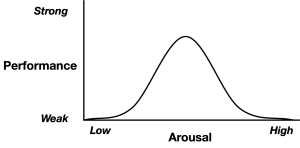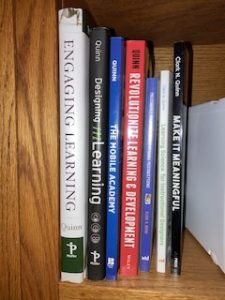In a conversation yesterday, we were talking about what works in presenting yourself (in this case, for a job). I mentioned that in the US you have to perhaps overpromise, whereas my experience in Oz (coloured, as it is, by its Brit origins ;), was that you underpromise. The latter worked well for me, because I believe I tend to err on the side of quiet; I don’t like boasts. I was suggesting, in this case, that you needed what made one unique to a particular situation. Thinking further, I think I do value what is uniqueness. What do I mean?
So, to get a (proper?) Ph.D., you are expected make a unique contribution to understanding. Consider our knowledge as a giant ball, and what a thesis does is push out one tiny bump. The goal is something no one else has done. For instance, for my Ph.D., I broke analogy up into a different set of steps, and measured performance. My specification of steps was unique, but that wasn’t the contribution (in my mind, at least). What I also did was try training to improve those processes (four of the six, for reasons), and it did impact a couple, with good reasons not to have impacted the others. It wasn’t earth-shattering, by any means (I suspect no one cites my thesis!), but it was a contribution. (And, of course, it grounded me in the literature and practices.)
When I think of folks I respect, in many cases it’s because they have made a unique contribution. By the way, I suppose I should be clear: unique isn’t enough, it has to be a positive contribution (which can include ruling out things). It’s like innovation: not just an idea, but a good one! So, for instance, Will Thalheimer’s been a proponent of evidence-informed practices, but his unique contribution is LTEM. So too with Patti Shank and multiple choice questions, Michael Allen with SAM, Harold Jarche with PKM, etc. I’m kind of thinking right now that Julie Dirksen’s new book is what’s really new! I am inclined to think that new syntheses are also valuable.
For instance, my own books on myths and learning science are really syntheses, not new ideas. (Maybe my mobile books too?) Reflecting, I think that the three books that I wanted to publish, my first on games, my fourth on L&D strategy, and my most recent on engagement (channeling the core from the first book), are more unique contributions. Though I will self-servingly and possibly wrongly suggest my way of thinking about contexts, models, and more are innovations. Like Allen’s CCAF (Context – Challenge – Activity – Feedback), perhaps.
Which isn’t to say syntheses that organize things into new and more comprehensible ways isn’t also a contribution. In addition to (immodestly) my afore-mentioned books in that category, I think of folks like Connie Malamed, Christy Tucker, Matthew Richter, Ruth Clark, Jane Bozarth, etc. These folks do a great job of taking received wisdom and collating and organizing it so as to be comprehensible. And I could be providing too short a shrift in some cases.
My stance is that I don’t see enough ‘uniqueness’. Original ideas are few and far between. Which may be expected, but we have to be careful. There are a lot more touted ideas than there are good ones. What really is different? What’s worth paying attention to? It’s not an easy question, and I may be too harsh. There is a role for providing different perspectives on existing things, to increase the likelihood that people hear of it. But those should be new perspectives. I’m not interested in hearing the same ideas from different folks. So, does this make sense, or am I being too harsh?
By the way, I suspect that there are more ideas than we actually hear about. I know people can be hesitant about sharing them for a variety of reasons. If you’ve got an idea, share it with someone! If they get excited, it may well be new and worthwhile. Take a chance, we may all benefit.

 In our field of learning design (aka instructional design), it’s too frequently the case that folks don’t actually know the underlying learning
In our field of learning design (aka instructional design), it’s too frequently the case that folks don’t actually know the underlying learning 
